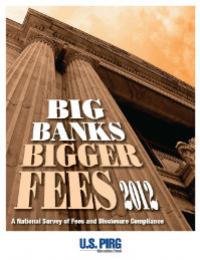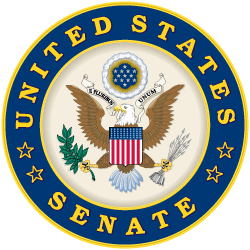Big Banks, Bigger Fees
PIRG’s new national survey shows bigger banks are more likely to charge for checking accounts. And fewer than half of all bank branches readily disclose fees, as the law requires.

PIRG’s new national survey shows bigger banks are more likely to charge for checking accounts. And fewer than half of all bank branches readily disclose fees, as the law requires.

St. Louis Post-Dispatch warns of a “truly awful piece of legislation” that could “sneak through the 112th Congress before it adjourns at year’s end,”









“Americans blame banks for the 2008 financial crisis, and view financial reform as a way to ensure that bad mortgages and repackaged debt don’t trigger another banking collapse.” That’s one of the clear the lessons of the 2012 elections – and a big problem for









There’s move afoot in the lame-duck Congress to strip power and independence away from financial and other regulators, according to David Dayen of Firedoglake. He’s talking about S 3468, the Independent Regulatory Analysis Act. In the name of more cost-benefit analysis, it would (as AFR says









Senators Jeff Merkley (D-Ore.) and Carl Levin (D-Mich.) have appealed to regulators to finish work on the Volcker Rule, which was meant to prevent banks from engaging in hedge-fund style trading. That basic principle has been “the law of the land for over two years,”









The Federal Deposit Insurance Corp. is looking into payday loan-like products offered by U.S. Bank, Wells Fargo and other lenders. The inquiry, according to the Portland (Ore.) Business Journal grew out of a February letter in which Americans for Financial Reform and more than 200









First the government wheedled his company into buying Bear Stearns; then the government sued his company over the misdeeds of Bear Stearns – that’s JPMorgan Chase CEO Jamie Dimon’s hard-luck story. Don’t buy it – that’s the message of an AFR letter to the co-chairs of


Bank lobbyists plan to make the most of the lame-duck session of Congress that gets underway after the election. Almost before anyone has a chance to notice, they hope to pass an amendment undermining a crucial piece of the Dodd-Frank Wall Street reform law —









In a joint letter, AFR urges the SEC and CFTC not to exempt this common type of financial guarantee, which closely resembles a swap, from new derivatives rules.









“Consumer groups are urging the monitor of the national mortgage settlement to add data on race, ethnicity and geography to determine whether the five largest servicers are offering relief to communities hit hardest by foreclosures,” The American Banker reports. In an Oct. 31 article, The